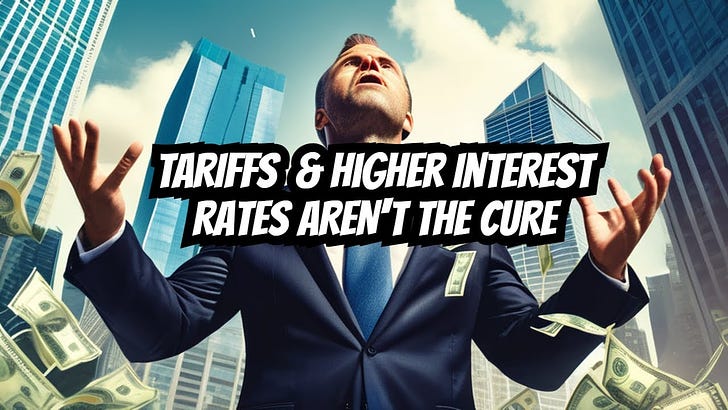Stop raising interest rates & tariffs for problems created by corporations. There's a better way!
Our government and economic system ask the poor and middle class to pay tariffs and higher interest for problems created by the private sector and others. There is a better way.
Stop raising interest rates & tariffs.
This post highlights a significant issue affecting the American economic landscape: the imposition of tariffs and increased interest rates to counteract inflation, aka Corporate Greed Rate, aka CGR, ostensibly created by corporate and international actions. This critique concerns the American government’s response to China’s practice of dumping subsidized steel on the American market. Instead of offering subsidies to American steel producers to make domestic steel more competitive, the government opts to impose tariffs on Chinese steel, making it more expensive for American consumers and businesses. This approach burdens the average American, particularly the middle class, with additional costs in an inflated economic environment.
The burden of economic policy decisions—aimed ostensibly at protecting American industries and curbing inflation—falls so heavily on American consumers. Tariffs, while potentially protecting domestic industries, act as a tax on the American people, making imported goods more expensive and thus driving up prices domestically. The same logic applies to raising interest rates; it is a tool the Federal Reserve uses to cool down a purported overheated economy by making borrowing more expensive. However, this too disproportionately impacts average citizens who rely on credit for major purchases like homes and cars.
A short segue: Inflation is generally caused by too much money chasing too few available goods and services. The truth is that most of our shortages, if any, are manufactured by manipulative corporations (cutting production/distribution of oil is the perfect example) or by corporate ineptitude (e.g., offshoring coupled with just-in-time inventory).
The progressive perspective suggests a paradigm shift in addressing these economic problems. The government could subsidize American steel production rather than penalize consumers with higher costs and restrict economic activity. This would lower the cost of domestic steel, making it more competitive without imposing additional financial burdens on consumers. Furthermore, such a strategy would keep economic activity buoyant and maintain money circulation within the U.S., potentially leading to higher production volumes and employment in the steel industry.
Another innovative proposal is the idea of taxing corporate profits that are seen as contributing to inflation. The tax revenue generated could then be redistributed to Americans, offsetting the higher costs imposed by corporate pricing strategies. This approach alleviates the financial strain on consumers and holds corporations accountable for their role in economic inflation.
If the corporate sector decides to penalize the market by creating scarcity, we, the people, must give them the option to be responsible citizens or penalized. We should remember that corporations used to have charters of existence for a limited time for a purpose beneficial to society. If they cannot behave for societal good, their inexistence is preferable.
The broader economic system unfairly penalizes the people who drive market demand: the American consumers. By continuously shifting economic burdens onto the middle class, the system fails to address the root causes of economic disparities and instead perpetuates them.
This progressive narrative emphasizes the need for policies that do not merely react to economic challenges with broad, punitive measures but instead address the specific behaviors and practices that contribute to those challenges. The proposed methods—subsidizing industries affected by foreign competition and taxing inflationary corporate profits—aim to create a more equitable economic landscape where the benefits and burdens of economic activities are more evenly shared.
We must all engage with and support progressive platforms that advocate for these policies. By subscribing to channels that promote progressive ideas and participating in discussions that advance these concepts, individuals can contribute to a broader movement towards a more fair and balanced economic system.
We must challenge the conventional economic measures and advocate for a more progressive, thoughtful approach to economic policy that directly targets the practices contributing to economic difficulties. Such policies not only promise to alleviate the immediate financial burdens on consumers but also encourage a healthier, more sustainable economic structure that benefits a broader segment of the American populace. As the progressive message spreads, the hope is that more citizens will recognize the merit of these ideas and push for significant policy shifts that reflect these principles.
Please support our values via Independent Media.
The other side has big donors and everyday citizens who invest heavily in platforms that lie and misinform. All we have is you. So, please invest in our media outlet by clicking the subscribe button below to become a paid subscriber. You won’t miss that coffee, but it will make a difference in our politics as we spread the truth about our policies and progressive politics. All paid subscribers get to read my five books on this platform and all subsequent books I write. They will also be privy to subsequent incentives.







Thanks for linking to the 2018 ABA article on corporate personhood. Great content. (Your link: https://www.americanbar.org/groups/crsj/publications/human_rights_magazine_home/we-the-people/we-the-people-corporations/#:~:text=This%20wasn't%20always%20the,corporations%20to%20continue%20in%20perpetuity)
Foreign competition? It's complicated. Nearly all peer nations have some flavor of universal healthcare. US companies struggle with our insane and exorbitant system to cover employees, driving up business costs. Leveling the playing field could mean (a) adopting US single-payer universal healthcare, or (b) demanding all our trading partners stop providing their citizens with universal care. Related ref.: https://medium.com/@idember/universal-healthcare-boon-to-business-owners-3ff561951da1